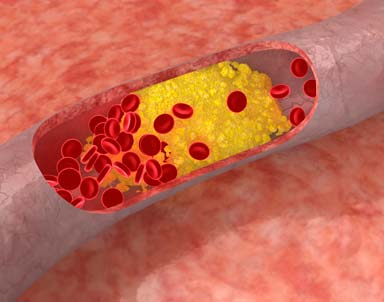
What is Cholesterol?
Cholesterol is a waxy, fat-like substance made in the liver and found in certain foods, such as food from animals, like dairy products (whole milk), eggs and meat. The body needs some cholesterol in order to function properly. Its cell walls, or membranes, need cholesterol in order to produce hormones, vitamin D and the bile acids that help to digest fat. But, the body needs only a small amount of cholesterol to meet its needs. When too much is present health problems such as coronary heart disease may develop.
High Cholesterol: Understanding Cholesterol Numbers
Cholesterol levels should be measured every 4 to 6 years by everyone over the age of 20. The test that is usually performed is a blood test called a lipoprotein profile. The lipoprotein profile includes: LDL, HDL, and Triglycerides.
| Total cholesterol | Less than 200 mg/dL |
| LDL (bad) cholesterol | Less than 100 mg/dL |
| HDL (good) cholesterol | Greater than or equal to 60 mg/dL |
| Triglycerides | Less than 150mg/dL |
LDL Cholesterol
LDL cholesterol can build up on the walls of your arteries and increase your chances of getting heart disease. That is why LDL cholesterol is referred to as “bad” cholesterol. The lower your LDL cholesterol number, the better it is for your health. The table below explains what the numbers mean.
Your cholesterol numbers are important, but they are just part of your overall health. Your doctor will look at your cholesterol numbers, along with your family history, age, gender, and other parts of your lifestyle or health, such as smoking, that could raise your risk for high cholesterol.
This complete picture helps your doctor determine whether you should take steps, such as lifestyle changes or cholesterol-lowering medicine, to lower your risk for heart disease and stroke.

HDL Cholesterol
When it comes to HDL cholesterol — “good” cholesterol — the higher the number, the better it is for your health. This is because HDL cholesterol protects against heart disease by taking the “bad” cholesterol out of your blood and keeping it from building up in your arteries.
Triglycerides
Triglycerides are the chemical form in which most fat exists in food and the body. A high triglyceride level has been linked to the occurrence of coronary artery disease in some people.
Total Cholesterol
Your total blood cholesterol is a measure of LDL cholesterol, HDL cholesterol and other lipid components.
